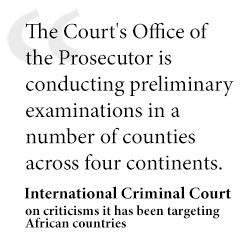Panelo says Philippines ousted 2 presidents without ICC
MANILA, Philippines — The Philippines does not need the International Criminal Court because the country ousted two presidents without its help, chief presidential legal counsel Salvador Panelo stressed Tuesday.
Panelo was referring to former presidents Ferdinand Marcos Sr. and Joseph Estrada.
"The ICC is precisely drafted so we will have mechanism to prosecute leaders who violate human rights. In the end, did we need ICC to oust Mr. Marcos? Did we need ICC to jail Mr. Estrada? Did we need the ICC to have the EDSA revolution? We don't need the ICC," he said at a forum at the University of the Philippines' Bonifacio Global City campus.
Marcos, whose two-decade rule was marred by human rights violations and corruption, was ousted in 1986 through the People Power Revolution. Three decades after his ouster, the living Marcos family members are still aiming to secure political posts.
Estrada, meanwhile, was ousted by another uprising in the capital after an aborted impeachment. He was found guilty of plunder but was pardoned by former president Gloria Macapagal Arroyo.
The former president has been serving as the mayor of Manila since 2013.
Panelo also compared the Philippines to the United States, which never joined the ICC.
"Are you saying that the United States and other countries that [have] withdrawn don't respect the rule of law? Precisely, it's the rule of law that the president is invoking when he removed [the country] from the ICC," he said.
What the ICC means for Philippines, other countries
For UP professor Tony La Viña, howeer, the country "badly needs" international law to deal with domestic affairs.
"We have international laws because we need [these]. Some states need it more than others. States like the Philippines, we badly need the international law," he said at the same forum.
By adopting the Rome Statute establishing the Hague-based International Criminal Court, 120 countries in 1998 accepted the jurisdiction of a tribunal to prosecute perpetrators of the most serious crimes such as those against humanity, genocide, war crimes and crime of aggression.
The Philippines, meanwhile, ratified the Rome Statute in 2011.
The ICC was built to avoid what happened after conflicts in the 20th century such as the Second World War. Many of the atrocities committed went unpunished.
ICC targeting non-Western countries?
Panelo dropped an oft-repeated criticism of the ICC, saying it has become a "tool to repress non-Western countries."

The ICC, however, has countered similar observations in the past. It said it was Africans that made the "most meaningful declarations about the Court."
"In fact, Africa is the most heavily represented region in the Court's membership," the ICC explained in its publication, "Understanding the International Criminal Court."
It said the investigations conducted by ICC prosecutors were opened at the request of or after consultation with African governments.
"The Court's Office of the Prosecutor is conducting preliminary examinations in a number of counties across four continents," it said.
- Latest
- Trending




























